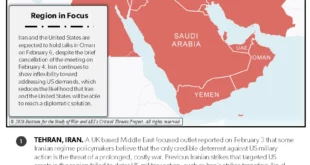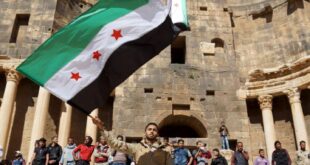BAGHDAD (AP) — American troops are stepping up operations in the Baghdad area to combat “death squads†and dampen down the violence threatening the new unity government, a US general said Monday.
US and Iraqi forces conducted 19 operations last week targeting death squads, US spokesman Maj. Gen. William Caldwell told reporters. All but two were in Baghdad, he said.
“Clearly Baghdad is the centre that everybody is fighting for,†Caldwell said. “We will do whatever it takes to bring security to Baghdad.†Security in the Iraqi capital is expected to figure prominently in talks Tuesday in Washington between President George W. Bush and Prime Minister Nuri Maliki.
Many of the death squads are believed to be associated with either Sunni or Shiite armed groups, targeting members of the rival sect as part of a struggle for power between the country’s two major religious communities.
The tit-for-tat killings accelerated after the February 22 bombing of a Shiite shrine in Samarra and have steadily increased despite establishment of Maliki’s national unity government last May.
On Monday, the city morgue in Kut, a mostly Shiite city southwest of Baghdad, reported receiving 19 bodies — blindfolded and some showing signs of torture.
They were believed victims of sectarian death squads, city officials said.
US officials have avoided identifying death squads and militias by sect, preferring instead to refer to them as criminals and thugs.
“We have not seen the death squads associated with any one particular sect,†Caldwell said. “But they’re not part of a larger organisation that we can see.†He said “very extremist elements†from both sectarian communities were “using murder and assassination as their means by which to further their personal goals.†Many Iraqis believe they are operated by Shiite militias and Sunni extremist groups, some of which have ties to political parties. Combatting death squads runs the risk of armed confrontation with militias such as the Mehdi Army of radical Shiite cleric Moqtada Sadr, a major political player in Iraq whose movement is part of Maliki’s government.
Last Saturday, US and Iraqi troops fought a three-hour gunbattle with Sadr’s militiamen in Musayyib. Fifteen militiamen and one Iraqi soldier were killed. The week before, British soldiers arrested Sadr’s militia commander in the Basra area of southern Iraq.
The rise in sectarian violence has shifted attention away from the Sunni-led insurgency most active western Anbar province to Baghdad, a city of six million people with large communities of Shiites, Sunnis and Kurds.
The Baghdad area recorded an average of 34 major bombings and shootings for the week ending July 13, the US military said. That was up 40 per cent from the daily average of 24 registered between June 14 and July 13.
US officials believe control of Baghdad — the political, cultural, transport and economic hub of the country — will determine the future of Iraq. But the city’s religiously mixed communities have become the focus of sectarian violence.
Iraq’s army and police, which are heavily Shiite, have had trouble winning the trust of residents of majority Sunni neighbourhoods.
As a result, the top US commander in Iraq, Gen. George W. Casey Jr., has said more US troops may take to the streets to bolster Iraqi forces, especially in mostly Sunni areas such as Dora, Amariya and Ghazaliyah.
However, that could lead to more US casualties. As US troops gradually pulled back and handed over security to the Iraqis, deaths among Iraqi soldiers and police have been rising while American losses ebbed.
Figures compiled by the Associated Press show that between January 1 and July 24, at least 933 Iraqi soldiers and police were killed compared with 382 US deaths for the same period. At least 31 American service members have died this month in Iraq — half the number in June and May.
Nevertheless, Baghdad was relatively calm Monday.
Five civilians were killed and four others were wounded Monday evening when mortar shells crashed into a southern Baghdad neighbourhood, police.
Elsewhere, gunmen killed four men selling construction materials in the insurgency-plagued city of Ramadi, about 115 kilometres west of Baghdad, police said. A policeman in Mosul and a youth ministry employee in Baghdad was also gunned down in a drive-by shootings.
 Eurasia Press & News
Eurasia Press & News



